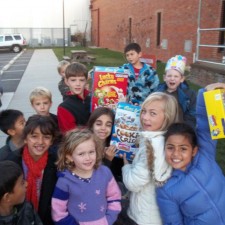 When Megan’s parents and the staff at her elementary school met to discuss her school performance, there was an unexpected revelation: The family was struggling to provide food and other basics for their daughter.
When Megan’s parents and the staff at her elementary school met to discuss her school performance, there was an unexpected revelation: The family was struggling to provide food and other basics for their daughter.
Megan’s mom talked to the assistant principal about some of the family’s difficulties. She “told us how desperate they were for daily necessities,” he said. School staff brainstormed ways to help, and one of the solutions—food from the Central Virginia Food Bank—fit right into the child’s backpack.
Megan’s Henrico County school is one of 24 schools that participated last school year in the BackPack Program, One of several Food Bank initiatives to fight childhood hunger in the region. The program offers enough food to prepare six well-balanced meals over the weekend, when students don’t have access to free or reduced price school meals.
“It was arranged to have this little girl get the food on Fridays,” noted the assistant principal, who was struck by the results this simple solution generated. Megan transformed into a different kind of student, working hard, completing homework, and making progress in the classroom.
“This has made a huge difference in her daily attitude, and we are sure the food is the primary cause,” he said.
Unfortunately, Megan’s case is not unique. Research demonstrates a link between childhood hunger, behavior and learning. Here in the Richmond metropolitan area, those who work with children don’t have to rely on outside studies; they see the impact first-hand. According to Terrance Jones, director of Alliant Human Services, many of the children they serve “don’t receive adequate food at home—or not the most nutritious.”
Students with hunger needs are often known to the teachers, counselors, and others who interact with them regularly. But crafting solutions beyond the school Day can be a challenge for educators who have plenty on their own plates as they work to provide quality instruction.
Whether a child needs food to get them through the weekend or a hot, healthy meal after school when working parents can’t provide it, the Food Bank has a program to fill the hunger gap. “Childhood hunger has become one of our major focus areas,” explains Fay Lohr, CEO of FeedMore, the umbrella organization of the Food Bank and Meals on Wheels. “It’s a regional issue, and we know our programs can have a big impact on children in need.”
Partnerships between the Food Bank, area schools, nonprofits serving students, and volunteers in the community ensure that teachers can concentrate on teaching, while children can focus on learning.
“Food is the building block for a child’s success in school and in life,” adds Lohr. “This school year, through an expansion of the Food Bank’s childhood hunger programs and with the help of many supporters, thousands of children will access the nutritional building blocks they need as they learn in and outside of school.”



